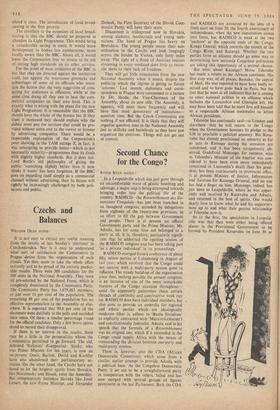Czechs and Balances
WILLIAM DEAN writes :
It is not easy to extract any useful meaning from the results of last Sunday's 'elections' in Czechoslovakia. Nor is it easy to understand what sort of satisfaction the Communists in Prague derive from the organisation of such rituals. Yet they seem to take the whole affair seriously and to be proud of the entirely predict- able results. There were 300 candidates for the 300 seats in the National Assembly. They were all pre-selected by the National Front, which is completely dominated by the Communist Party. The Communist Party has 1,679,483 members, or just over 11 per cent of the population. The remaining 89 per cent of the population has no effective representation in the Assembly or else- where. It is reported that 99.8 per cent of the electorate went dutifully to the polls and recorded their votes. Of these,' a similar percentage voted for the official candidate. Only a few brave spirits dared to record their disapproval.
If there is no interest in the results, there may be a little in the personalities whom the Communists permitted to go forward. The old, defeated 'Stalinists' disappeared: Siroky, who was Prime Minister for ten years, is now an un-person; Duris, Bacilek, David and Koehler have also abandoned their parliamentary ac- tivities. On the other hand, the Czechs have not dared to let the brighter spirits from Slovakia, like Novomesky and Husak, enter the Assembly. But 'comparatively harmless Slovaks like Josef Lenart, the new Prime Minister, and Alexander Dubcek, the First Secretary of the Slovak Com- munist Party, will have their seats.
Discontent is widespread now in Slovakia, among students, intellectuals and young tech- nicians. The hand of Prague lies heavy on Bratislava. The young people resent their sub- ordination to the Czechs and look longingly across the border to Vienna, only forty miles away. The sight of a flood of Austrian tourists streaming in every weekend does little to recon- cile them to their lack of freedom.
They will get little consolation from the new National Assembly when it meets, despite the publicity which the regime is giving to future 'reforms.' Last month, diplomats and corre- spondents in Prague were summoned to a lecture by Dr. Skoda, the Vice-Chairman of the Assembly, about its new role. The Assembly, it appears, will meet more frequently and will have that most democratic of institutions— question time. But the Czech Communists are nothing if not efficient. It is likely that they will organise question time in the National Assembly just as skilfully and harmlessly as they have just organised the elections. Things will not get out of control.






























 Previous page
Previous page